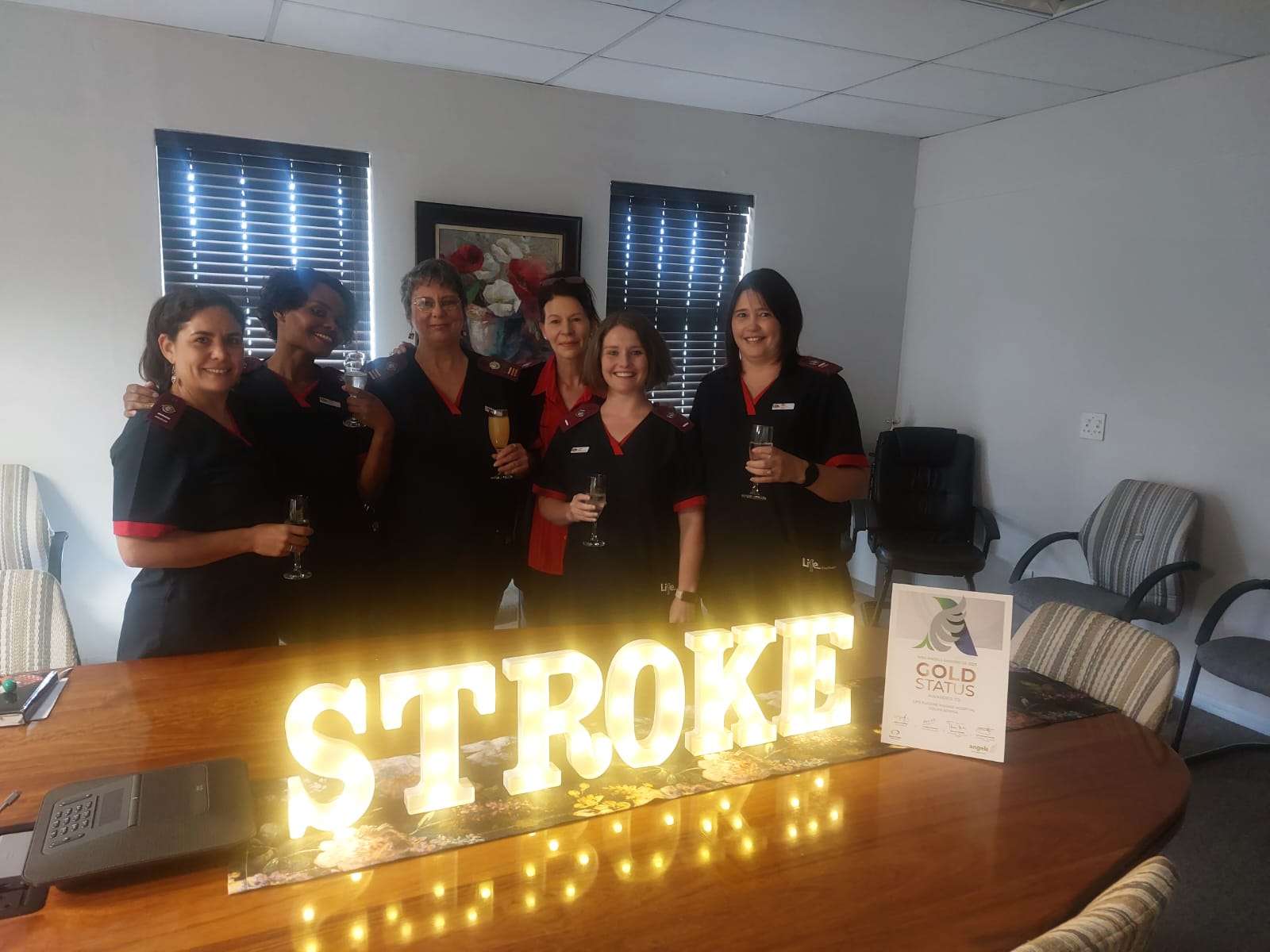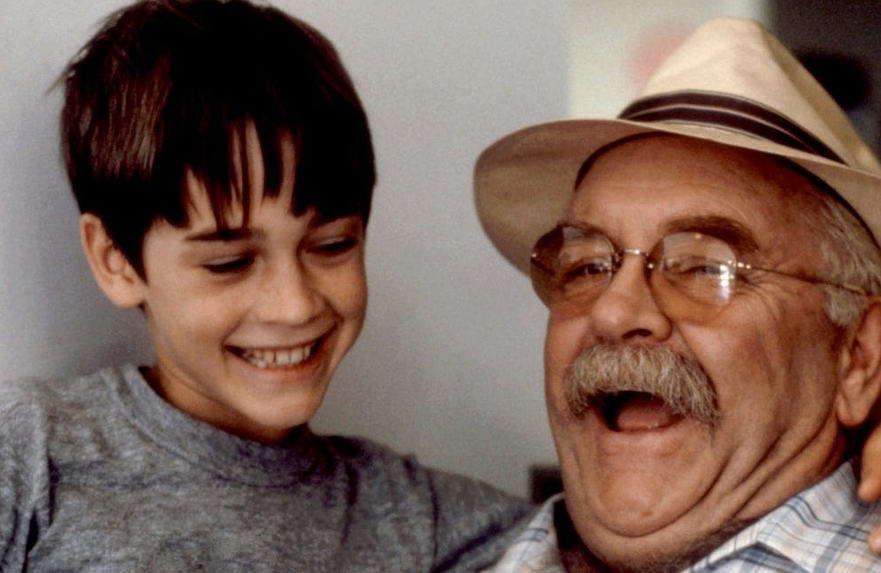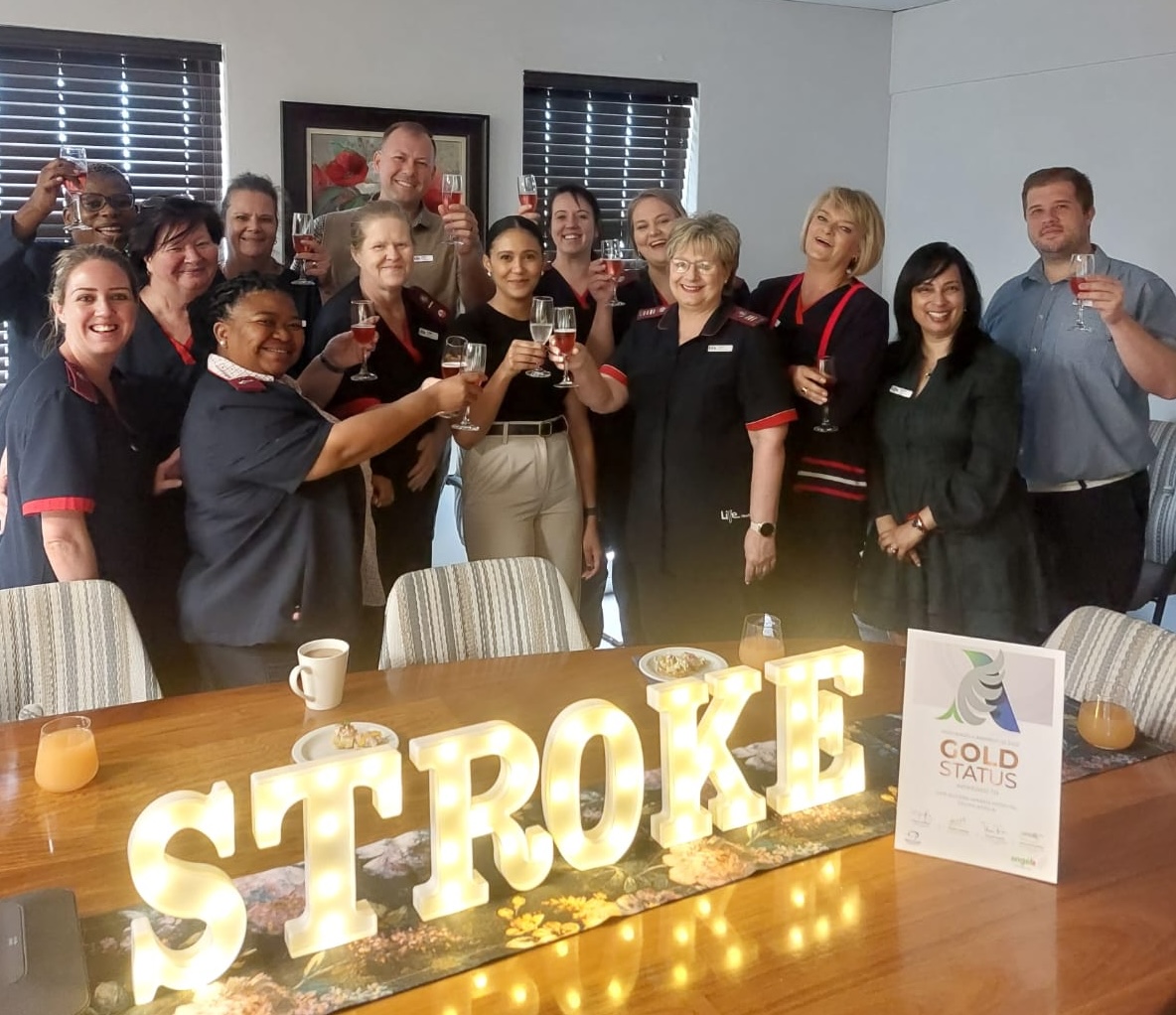
ANGELIQUE BURGER miał 16 lat i odwiedzał babcię, gdy miało miejsce katastrofalne zdarzenie, które wpłynęłoby na przebieg jej życia.
Pierwszym sygnałem, że coś było strasznie nie tak, było to, że jej babcia wydawała się zdezorientowana i miała dziwną mowę. "Co jest złego z granny?" Angelique pamięta, że pyta jej rodziców.
Czułem się niekontrolowany” – mówi. "Nie wiedziałam, co robić. Wtedy podjęłam decyzję o pójściu do pielęgniarstwo – z powodu opieki, którą otrzymała lub raczej nie otrzymała. Ze względu na różnicę, odpowiednie osoby mogły jej pomóc”.
udar jej babci uświadomił jej, jak ważny jest dostęp do "odpowiedniej osoby" podczas takiego wydarzenia, więc Angelique podjęła decyzję o byciu właściwą osobą.
Jako koordynator opieki w szpitalu Life Eugene Marais Hospital w Pretorii, Anqelique podaje ścieżkę pacjent, zapewniając, że wszystkie ruchome części działają i upewniając się, że nic nie zostało pominięte. Odpowiada również za gromadzenie i wprowadzanie danych pacjent z udarem do rejestru poprawy leczenie udaru RES-Q. Jest też częścią zespołu pielęgniarka, którego celem jest poprawa leczenie udaru mózgu w swoim szpitalu, który w Q3 2023 r. otrzymał nagrodę za pierwsze złotą nagroda.
Rozwiązywanie problemów i osiąganie celów
W 1 lutego 2024 kierownik oddziału urazowego, St Helet Viljoen, zaznaczył 33 lata bycia właściwą osobą. Ścieżka udar w szpitalu Life Eugene Marais, gdzie pracowała od 1991 roku, dosłownie zaczyna się od niej. W każdej porze dnia lub nocy otrzymuje powiadomienia z wyprzedzeniem od pogotowie ratunkowe ratunkowego na telefonie komórkowym, przekazuje słowo do odbioru, organizuje otwarcie pliku i zapewnia pacjent z udarem priorytetowy dostęp do skanera TK.
Nie marzyłaby o zrobieniu niczego innego.
Droga do poprawy leczenie udaru w szpitalu Life Eugene Marais Hospital rozpoczęła się pod koniec 2018 roku, kiedy szpital nawiązał współpracę z Inicjatywa Angels. Pierwsze multidyscyplinarne spotkanie odbyło się w marcu 2019 r., a Sr Janneke Verster został koordynator nowo utworzonej ścieżki leczenia udar, nadzorującym program szkoleń, symulacji, cotygodniowych spotkań i kontaktów z społecznością. Chociaż szpital nie miał neurolog, dedykowany zespół wprowadził środki mające na celu skrócenie czasu do rozpoczęcia leczenie, a badania przesiewowe pod kątem dysfagia stały się integralną częścią opieki.
W 2020 r. pandemia Covid zakłóciła leczenie udaru na całym świecie, a po tym, jak Sr Verster opuścił szpital w październiku tego roku program poprawy leczenie udaru stracił tempo. Jednak w 2022 r. iskra była oświetlona przez dyrektora pielęgniarstwo, Sr Amelia Maraisa, który wlał serce i duszę do misji zapewnienia lepszej opieki pacjentom z udar i zainfekowała swoich współpracowników pasją. To ona ponownie zainstytuowała multidyscyplinarne spotkania, które konsultant Angels, Carla Scholtz, uważa za kluczowy element ich sukcesu, a specjalista ds. szkoleń klinicznych, Sr Marina Tsiane i Angels, wspierali szkolenie pielęgniarek w całym szpitalu.
Po włączeniu szpitala do badania RES-Q w styczniu 2023 r. spotkania stały się comiesięcznym forum rozwiązywania problemów i wyznaczania celów, ich postępy w kierunku złotej nagroda mierzonej prezentacjami Angelique dotyczącymi danych dotyczących leczenie udar.
"Odpowiedzi znajdują się w wynikach RES-Q", Carla przypomniała im, że gdy nie udało im się osiągnąć celu, odsyłając je z powrotem do pulpitu, aby zidentyfikować luki w jakości i naprawić je. Ale była jedna luka, na którą nie mieli planu działania – nie było neurolog, który był liderem zespołu.
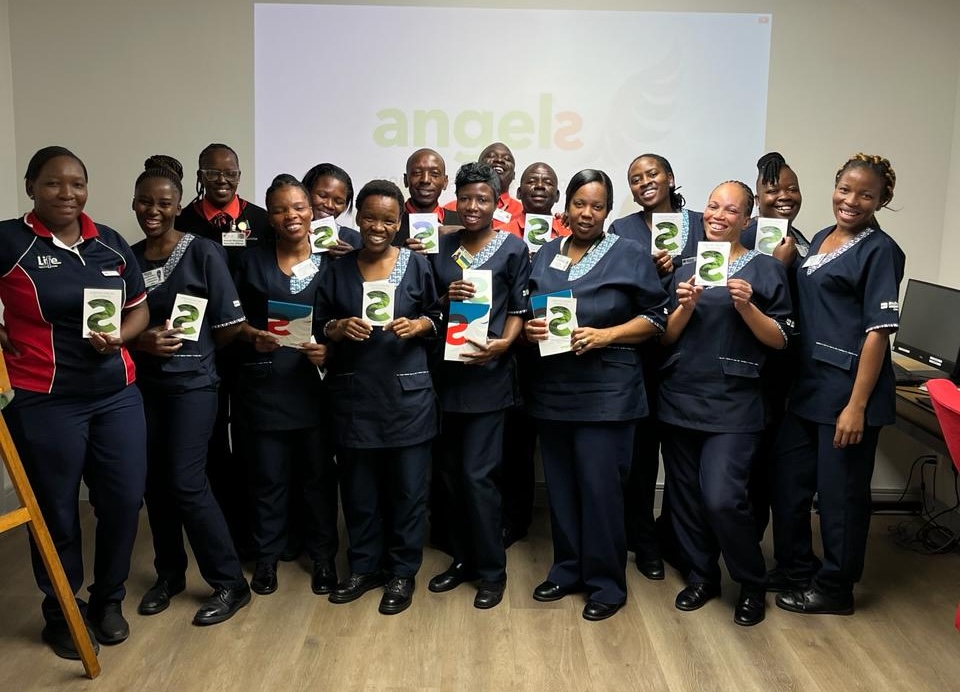
Od początku
Doktor Maropene Maloma stał się właściwą osobą w połowie roku 2023, kiedy dołączyła do szpitala Life Eugene Marais Hospital i znalazła już system leczenia udar. W jej poprzednim szpitalu – zatłoczonym państwowym zakładzie z bardzo ograniczonymi zasobami – program udar stawiał czoła przytłaczającym wyzwaniom. Przeszła od chęci rozwoju, odkryła swoje umiejętności, podjęła decyzje i wykorzystała swoją wiedzę w pracy.
W przypadku zespół udarowy kierowanego przez pielęgniarka była ona właśnie tym, co zalecił lekarz. Doktor Maloma zrozumiał cel i podzielił pasję, a do sierpnia 2023 roku Carla mówi: "nagroda była tak bliska, że mogliśmy ją poczuć". Raport danych Angeliques wykazał tylko jedną metrykę, w której spadli złoto i mieli plan działania, aby je naprawić. Ponieważ Q3 2023 r. doprowadziła do zakończenia, poświęcała dużo godzin na zapisanie wszystkich danych pacjent na czas na termin przyznania nagród.
Zainteresowanie dr Maloma neurologia i udar zostało wywołane podczas pracy jako fizjoterapeuta. Praca nawiązała kontakt z osobami, które przeżyły udar mózgu, a ona stała się zakorzeniona nauką i tajemnicą ludzkiego mózgu.
"Nawet w trakcie szkolenia byłem zafascynowany tym, jak wiedzieli, gdzie jest zmiana i dlaczego słabość występowała po jednej stronie, gdy zmiana była po przeciwnej stronie mózgu."
Jej praca w rehabilitacja pomagała osobom, które przeżyły, radzić sobie z deficytami spowodowanymi udar mózgu, ale chciała dowiedzieć się więcej.
"Więc zacząłem znowu", mówi. "Po dwóch latach jako fizjoterapeuta wróciłem do szkoły i od początku wiedziałam, że nie będę miał ochoty na ogólne. Musiałabym się specjalizować, a neurologia miała na myśli.
Niemniej jednak obwodnić drogę, która prowadzi do jej obecnej roli, jej doświadczenie w rehabilitacja wzbogaca jej pracę, ponieważ widziała na własne oczy różnicę, jaką może mieć właściwa osoba lub jej nieobecność.
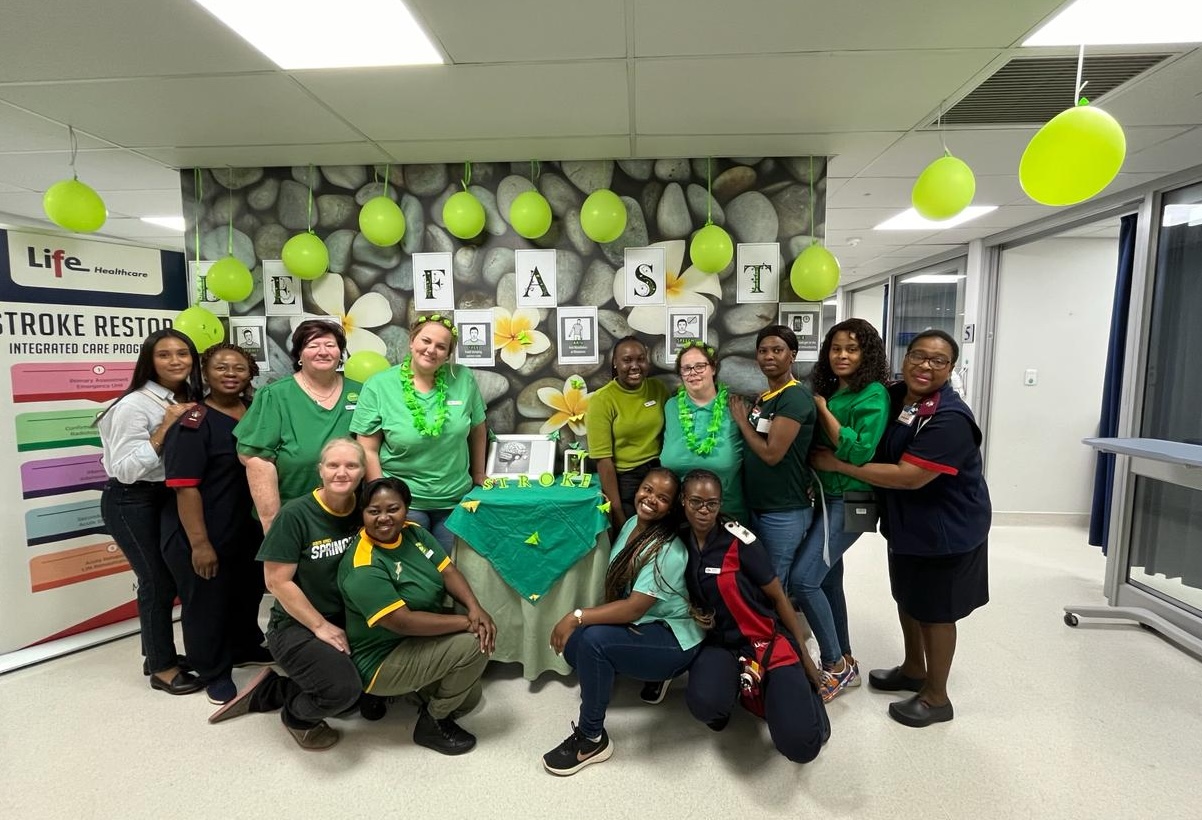
Praca bliskiej
Październik 2023 to miesiąc, o którym nigdy nie zapomni, mówi Carla. "W tygodniu udar spędziłem dużo czasu w szpitalu Life Eugene Marais Hospital i wszędzie była radość." Wyniki Q3 zostały wkrótce opublikowane i, podobnie jak każdego roku w okresie do Światowego Dnia Udaru Mózgu w dniu 29 października, miały miejsce działania związane z uświadomieniem sobie udar, takie jak nagrody za najlepszy plakat dotyczący świadomości udar i konkurs na dekoracje ciast, do których zaproszono Carla.
Nagrody rozdawano pod koniec tygodnia, ale największa nagroda została uratowana na ostatnią – ogłoszenie przez kierownika szpitala, że szpital Life Eugene Marais Hospital ostatecznie wygrał złotą nagroda WSO Angels.
Był to owoc nieco powyżej dziewięciu miesięcy ciężkiej pracy i determinacji, a po wysłuchaniu wiadomości St Marais usłyszał: "Ostatecznie urodziłem dziecko!"
Chociaż Sr Marais od lewej strony jest zespół, którego dziedzictwo ma zapewnić, że dziecko nie jest przeznaczone do bycia jedynym dzieckiem, a zakreśleniem jest Sr Verster, który wraca jako następca Sr Maraisa, aby kontynuować pracę nad zapewnieniem najlepszych możliwych wyników pacjentom z udar i ich rodzinom. W międzyczasie Carla i Angelique uważnie obserwują panel szpitala w RES-Q, ponieważ plan działania to pochłonięcie szpitala, który zdobył platynę.
W związku z tym, że pojawiła się nagroda, Sr Viljoen podaje, że karetki, które były używane do obejścia ich w drodze do szpitali dalej, coraz częściej przyjeżdżają do szpitala pacjentów z udar bezpośrednio. Złota nagroda mówi im, co muszą wiedzieć – pacjenci z udar znajdą tam odpowiednich ludzi.
